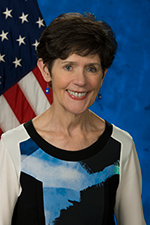Robert Wilkie, the president's pick to serve as Department of Veterans Affairs secretary, has immersed himself in meeting with key players and learning more about how the agency's health system works, a key VA official said on Wednesday.
Carolyn Clancy, M.D., executive in charge of the Veterans Health Administration, said that she has personally met with Wilkie several times about the unique challenges that face VA health.
"He clearly has healthcare squarely on his brain," she said.

Clancy was one of several speakers at a symposium on veterans' healthcare hosted by AMVETS in D.C. At the event, VA providers, policymakers and veterans themselves sounded off on the successes and challenges facing the department.
RELATED: VA finalizes interstate licensing rule that will 'open the aperture' for telehealth
President Donald Trump named Wilkie, a Department of Defense official, to serve as acting VA secretary after firing David Shulkin, M.D., in March. Wilkie is Trump's second pick to lead the agency full-time after White House doctor Ronny Jackson pulled his nomination amid controversy.
Response to Wilkie's nomination has been mixed. Veterans groups have pushed the administration to put deputy secretary Thomas Bowman in charge on an interim basis, though AMVETS said in a statement that if Wilkie is approved it would bring stability to the agency.
Clancy also discussed the VA's recent deal with Cerner to upgrade its electronic health record and concerns about privatizing the agency's health system. Finalizing the agreement with Cerner was crucial step to improving care, she said.
"It will solve an immense array of problems," Clancy said.
The deal was in the works for nearly a year, and will allow the VA's EHR to align more effectively with the DOD.
RELATED: Editor's Corner—Shulkin's firing has implications beyond the Cerner contract signing
VA privatization has become a political "flashpoint," Clancy said. The Trump administration's interest in privatizing the VA's health system has been a hot topic since Shulkin's ouster, which he said occurred because he opposed privatization.
The key, she said, is striking the balance between investing in the VA's infrastructure and workforce while also ensuring veterans can access the care that they need.
A major part of achieving that goal is included in the MISSION Act, which passed the Senate Wednesday afternoon and is headed for the president's desk. The legislation would sunset the Veterans Choice program and consolidate some of the agency's community care programs to make it easier for veterans to seek care outside of the VA if necessary.
RELATED: Veterans Choice isn’t the only way the VA approves care for rural veterans
Patients would need approval from their VA physician before seeking a private doctor.
Clancy said veterans can already take one of seven or eight pathways to care and can jump between those pathways on their care journey. Consolidating or eliminating those paths allows for more flexibility to meet veterans' needs.